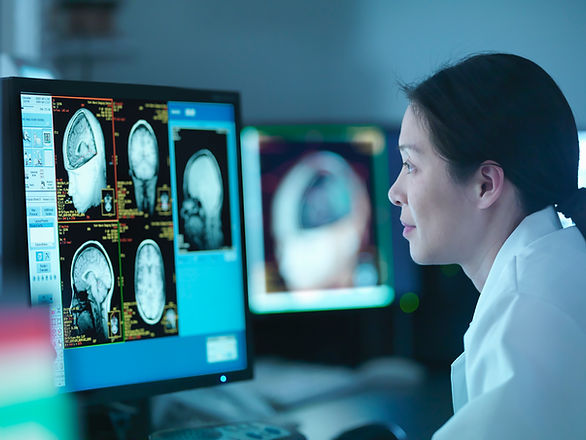
Presented by Brett Jarosz
Fellow Sports & Exercise Chiropractor (AICE 2019)
Neurorehabilitation Chiropractor (AICE 2022)
BAppSc(CompMed), MClinChiro, ICSC, PGradDipSportsChiro, DACNB, CertPT, ASCA Level 1, FICC, FAICE
Brett Jarosz is an ACA endorsed Fellow Sports & Exercise Chiropractor (AICE 2019), Neurorehabilitation Chiropractor (AICE 2022), researcher and international lecturer.
He has worked with the World Surf League, as a part of the medical team at the Rip Curl Pro Bells Beach, as well as Surfing Australia at the 2024 Paris Olympics. He consults with the Melbourne Storm NRL Team, along with several AFL teams, Olympic and elite athletes on neurotrauma, with his work being featured on 60 Minutes Australia, Apple TV, The Age, Herald Sun, and more.
For the past decade, Brett lectured within the Chiropractic degrees at RMIT University in Melbourne, and currently maintains a role as a lecturer for a number of post-graduate education programs.
Course Information
Concussion is among the most commonly occurring injuries in sport, with research indicating, globally, there is a one in five lifetime risk of concussion.
Multimodal Management of Concussion is an intensive 50-hour course (two 3-day, 25-hour modules) specifically designed for healthcare professionals to provide a foundational and progressive multimodal approach to concussion management. Delivered in an interactive, hands-on format, attendees will be provided with contemporary evidence-based practices, diagnostic techniques, and rehabilitation strategies.
The Multimodal Management of Concussion course will equip you with the knowledge and skills to help you become the go-to healthcare professional in your community.

Module One
Description
This 3-day, 25-hour module is dedicated to reviewing and evaluating current consensus statements and literature, which informs the comprehensive multimodal management approach to concussion.
We will discuss the pathophysiology of acute concussion, from the biomechanics to the neuropathology and neurobiology. We will relate and differentiate concussion and whiplash, and discuss cervical spine contributions to concussion symptoms. The “On-Field” and “Off-Field” management of acute concussion is reviewed, including the Sport Concussion Assessment Tool 6 (SCAT6), indications for imaging, and concussion phenotypes (subtypes). We discuss the Sport Concussion Office Assessment Tool (SCOAT6) as a clinical guide to a multidomain evaluation in the subacute phase post-concussion injury.
Utilising the expansive and evolving literature, we build the foundation of this course upon the development of competency in the clinical application of evidence-based assessments and diagnostic techniques, with minimal technology.

Module One Learning Objectives
Online self-paced learning (Module I pre-reading)
-
Consensus statements
-
Clinical practice guidelines
-
Standardised assessment tools
Interactive, Hands-on, On-site learning (3-days, 25 hours)
-
Epidemiology of concussion
-
Definitions of mTBI / concussion
-
Pathophysiology of acute concussion
-
Concussion phenotypes (subtypes)
-
“On-Field” and “Off-Field” management of acute and subacute concussion
-
Sport Concussion Assessment Tool (SCAT6)
-
Indications for imaging
-
Sport Concussion Office Assessment Tool (SCOAT6)
-
Patient Reported Outcome Measures (PROMs)
-
-
Rest and Exercise
-
Nutraceuticals and supplements for concussion
-
Return-to-Learn and Return-to-Sport
-
Persisting symptoms post-concussion
-
Evidence-based assessments and diagnostic evaluation
-
Autonomic Function / Exertional Intolerance
-
Vestibulo-Oculomotor Function
-
Optometric Function
-
Postural Stability
-
Motor Coordination
-
Cervical Musculoskeletal Function
-
Module Two
Description
This module builds upon the knowledge and understanding of the contemporary evidence-based concussion practices and diagnostic techniques, achieved in Module I.
It is a 3-day, 25-hour interactive, hands-on module with its’ foundation designed to develop expertise in concussion rehabilitation strategies.
Attendees will enhance their comprehension of the fundamental details of neural substrates that are disrupted by concussion, and the therapeutic modalities designed to support the normal adaptive physiology of the human body.

Module Two Learning Objectives
In office, competency development
-
To be completed between Modules I and II
-
Psychomotor skills development
Online self-paced learning (Module II pre-reading)
-
Treatments and rehabilitation for concussion
Interactive, Hands-on, On-site learning (3-days, 25 hours):
-
Review and comprehend:
-
The neural substrates that are disrupted by concussion
-
The evidence-based assessments and diagnostic evaluations (from Module I) and their associated neural substrates
-
-
Advanced computerised diagnostic testing
-
Fundamentals of neural plasticity in rehabilitation
-
Rehabilitation dosage and physiological adaptation
-
-
Rehabilitation strategies for various pathophysiologies commonly associated with concussion:
-
Autonomic Nervous System
-
Oculomotor, Visual and Vestibular pathophysiology
-
Postural Stability / Balance Training interventions
-
Cervical Musculoskeletal and Sensorimotor interventions
-
-
Rehabilitation strategies for specific neural substrates

Expressions of Interest:
Next course dates:
Module 1: TBD for 2026
Module 2: TBD for 2026
Location:
TBD for 2026
Course Fee: $2500
Registration link is available by expression of interest only.
Frequently Asked Questions
Will this program be recorded? No, there are no current plans to have this available as a recording as the large hands-on learning component makes video consumption of the material impractical.
Will further courses be held in the future? Depending on demand, yes. If sufficient people (minimum 10) are interested in the course then we may look at running further programs in Melbourne or interstate. However this is subject to interest.
I have not done any post-graduate neuro-rehab training. Will this course be right for me? While a background in neurological rehabilitation is definitely an advantage, this course is designed to allow Allied Health Practitioners who have not completed further neurological rehab training to gain the foundational understanding required to start to assess and manage these cases.
Are places in this course limited? Yes - places will be capped at 25 attendees per module.
What is the refund policy? Due to the costs associated with organising the course, registrants who inform us they are unable to attend at least seven (7) days before the module commences will be offered a refund for that module. At seven (7) days or less we will be unable to offer a refund but tickets are transferable, meaning you can on-sell the ticket to a colleague.
Any further questions? Email us at: brettjarosz@gmail.com





